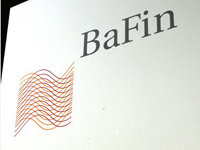Politics
Bank levy on saving banks too?
 In late October after long discussions the Bundestag decided on the bank levy. The money taken from the banks is going to go into a €70 billion fund to help rescue credit institutions in the event of trouble. The Bundestag resolution explicitly states that savings banks and cooperative banks must also contribute to the fund – only development banks and the Agricultural Pension Bank are excepted. However, the so-called Restructuring Act has still to pass the Bundesrat. Here it appears that the Länder of Baden-Württemberg and Hessen in particular are to call on the mediation committee to exempt savings banks and cooperative banks from the rule. Along with the bank levy the Bundestag brought in a pay ceiling of €500,000 for all employees in a government-supported bank. Previously this provision had applied only to the boards of institutions supported. At credit institutions where the State has over 75% involvement, in future bonuses and variable pay are also to go. Additionally, a new insolvency procedure was adopted for system-relevant banks. It should mean these can be more quickly restructured or wound down in orderly fashion.
In late October after long discussions the Bundestag decided on the bank levy. The money taken from the banks is going to go into a €70 billion fund to help rescue credit institutions in the event of trouble. The Bundestag resolution explicitly states that savings banks and cooperative banks must also contribute to the fund – only development banks and the Agricultural Pension Bank are excepted. However, the so-called Restructuring Act has still to pass the Bundesrat. Here it appears that the Länder of Baden-Württemberg and Hessen in particular are to call on the mediation committee to exempt savings banks and cooperative banks from the rule. Along with the bank levy the Bundestag brought in a pay ceiling of €500,000 for all employees in a government-supported bank. Previously this provision had applied only to the boards of institutions supported. At credit institutions where the State has over 75% involvement, in future bonuses and variable pay are also to go. Additionally, a new insolvency procedure was adopted for system-relevant banks. It should mean these can be more quickly restructured or wound down in orderly fashion.
Tough rules in Basel III
 At the G20 summit in Seoul in mid-November, new regulations for banks, the so-called Basel III rules, are to be decided on. According to them, the credit institutions must raise their solid core capital of shares and profit reserves from the current 2% to 4.5% by 2015, and to 7% by 2019. Big system-relevant banks can expect still more rigid rules. In future, too, so-called hybrid loans, which hitherto count towards core capital, will be treated as outside capital. After 2013, holders of newly issued government bonds are in extreme cases to do without part of their repayment, says a proposal by German Chancellor Angela Merkel (CDU). To date, in calculating their core capital ratio, banks could rate government bonds of the country where they have their headquarters as risk-free, or nearly so. Merkel’s demand would “torpedo” this provision, said an analyst. Bundesbank executive Andreas Dombret estimated the financial needs of German banks in coming years at €50 billion, in interview with manager magazine. According to a study by Barclays Capital, on the new rules 35 of the biggest US banks would have to build up their capital cover by 100 to 150 billion US dollars. This would have immensely negative effects on banks loan provision, warned US chief economist at Goldmann Sachs Jan Hatzius: the gross domestic product could go down by up to 2.5%.
At the G20 summit in Seoul in mid-November, new regulations for banks, the so-called Basel III rules, are to be decided on. According to them, the credit institutions must raise their solid core capital of shares and profit reserves from the current 2% to 4.5% by 2015, and to 7% by 2019. Big system-relevant banks can expect still more rigid rules. In future, too, so-called hybrid loans, which hitherto count towards core capital, will be treated as outside capital. After 2013, holders of newly issued government bonds are in extreme cases to do without part of their repayment, says a proposal by German Chancellor Angela Merkel (CDU). To date, in calculating their core capital ratio, banks could rate government bonds of the country where they have their headquarters as risk-free, or nearly so. Merkel’s demand would “torpedo” this provision, said an analyst. Bundesbank executive Andreas Dombret estimated the financial needs of German banks in coming years at €50 billion, in interview with manager magazine. According to a study by Barclays Capital, on the new rules 35 of the biggest US banks would have to build up their capital cover by 100 to 150 billion US dollars. This would have immensely negative effects on banks loan provision, warned US chief economist at Goldmann Sachs Jan Hatzius: the gross domestic product could go down by up to 2.5%.
Euler Hermes to be the first European ratings agency
In mid-November the Federal Institute for Financial Services Oversight (BaFin) stated that the registration process for ratings agencies in Europe had been completed. German Allianz subsidiary Euler Hermes would be licensed as the first ratings agency in Europe. Along with Coface in France, the credit provider will now be competing with the three American agencies Standard & Poor’s, Moody’s and Fitch. Euler Hermes wants particularly to make it easier for upper-middle-class people to access the capital market. As well as the registration obligation, ratings agencies will in future no longer be allowed simultaneously to advise a firm and in parallel rate its soundness.
EU plans further stress test
 In the first stress test, all the Irish banks came out well. After the upheavals in Ireland, the European Union has now announced that in spring 2011 there is to be another stress test with tighter rules. Its findings should be available by June 2011, said Giovanni Carosio, chair of the Committee of European Banking Supervisors (CEBS). The new stress test will above all lay down more precise rules and check liquidity buffers as well as capital reserves. The methodology of banks themselves developing various negative scenarios and then presenting them is to be supplemented by further tests by the watchdogs. These are intended in particular to test the plausibility of the institutions’ findings.
In the first stress test, all the Irish banks came out well. After the upheavals in Ireland, the European Union has now announced that in spring 2011 there is to be another stress test with tighter rules. Its findings should be available by June 2011, said Giovanni Carosio, chair of the Committee of European Banking Supervisors (CEBS). The new stress test will above all lay down more precise rules and check liquidity buffers as well as capital reserves. The methodology of banks themselves developing various negative scenarios and then presenting them is to be supplemented by further tests by the watchdogs. These are intended in particular to test the plausibility of the institutions’ findings.
BaFin to expand
 The Federal Institute for Financial Services Oversight (BaFin) is to increase its staff, its administrative board decided in November. The authority, located in Bonn and Frankfurt, is to appoint to 240 new posts and will thus for the first time since its foundation number over 2000 employees. BaFin head Jochen Sanio had asked for a further hundred posts. BaFin has taken on, in the course of the crisis, the supervision of banks and of their remuneration systems.
The Federal Institute for Financial Services Oversight (BaFin) is to increase its staff, its administrative board decided in November. The authority, located in Bonn and Frankfurt, is to appoint to 240 new posts and will thus for the first time since its foundation number over 2000 employees. BaFin head Jochen Sanio had asked for a further hundred posts. BaFin has taken on, in the course of the crisis, the supervision of banks and of their remuneration systems.















